TRENTON, NJ – A new effort to save the humpback whales in the North Atlantic Ocean has been launched to stop offshore wind energy farms in places like New Jersey. The commercial aims at New Jersey Democrat Senator Vin Gopal, who has fallen in line with Governor Phil Murphy and his radical clean energy plan that could once again put the species in danger.
The video, sponsored by the Republican State Leadership Committee, portrays offshore wind energy projects as the next great threat to the whales after decades-long conservation efforts brought them from the brink of extinction.
“During a television interview last week, Gopal unequivocally dismissed any possible connection between sonar mapping of the ocean floor and the tragic deaths of dolphins and whales up and down the Jersey shore,” said Steve Dnistrian, the Republican candidate for state senate in LD-11. “Gopal called anyone who believes in such a connection – including dozens of elected officials from both parties, advocates and concerned citizens – conspiracy theorists, which is inappropriate, insulting and callous. I stand with the bi-partisan coalition of elected official, advocates and citizens calling for a moratorium on all offshore wind activity. Implementing a moratorium is perfectly reasonable to everyone, except the governor, Gopal and those who stand ready to make billions of dollars off of the Murphy’s master energy plan. Clearly, they could care less about 40 dead dolphins and countless whales washing up on our beaches.”
The plight of the humpback whale was so dire in the 1980s that in the 1986 Star Trek film The Voyage Home, whales had become extinct by the 23rd century. The movie was credited for bringing the plight of the endangered species to the public spotlight.
“Humpback whales and their enchanting melodies once dwindled to a fragile whisper,” the narrator says. “Hunted to near extinction they rebounded against all the odds. A new peril looks beneath the waves; offshore wind, enormous man-made turbines fueling record beachings.”
It continues to target Gopal, a Jersey Shore-based state senator of blowing hot air on the topic.
“Senator Vin Gopal said he was concerned, then fell silent gentle Giants sacrificed for Gopal’s political agenda,” the commercial ends.
According to NOAA Fisheries, before the final moratorium on commercial whaling in 1985, humpback whale populations were decimated, with most facing reductions of over 95 percent. Thankfully, the species has shown signs of recovery in many regions, but it still confronts various threats, including entanglement in fishing gear, collisions with vessels, harassment from boats, and the detrimental effects of underwater noise.
Humpback whales inhabit oceans worldwide, undertaking extensive migrations each year, boasting one of the longest journeys of any mammal on Earth. Some populations travel up to 5,000 miles, navigating from tropical breeding grounds to colder, more abundant feeding areas. These majestic creatures sustain themselves by feeding on shrimp-like crustaceans (krill) and small fish, filtering vast amounts of seawater through their baleen plates, akin to a sieve.
Their common name, “humpback” originates from the noticeable hump on their backs, while their scientific name, Megaptera novaeangliae, stems from their large pectoral fins and early encounters with European whalers off the New England coast. Humpback whales are a favorite among whale watchers because they are playful and active, often breaching the water surface and slapping it with their pectoral fins or tails.
NOAA Fisheries is deeply committed to humpback whale conservation. Their scientists employ innovative methods to study, protect, and disentangle these magnificent creatures. Collaborating with partners, they develop regulations and management plans to mitigate entanglement risks in fishing gear, establish safer shipping lanes, and preserve crucial habitats.
Commercial whaling had a severe impact on humpback whale populations, prompting the United States to classify all humpback whales as endangered under the Endangered Species Conservation Act in 1970, followed by the Endangered Species Act in 1973. NOAA Fisheries worked globally to implement protective measures for humpback whales. The International Whaling Commission’s decisive moratorium on commercial harvesting since 1985 has significantly contributed to the species’ remarkable recovery.

